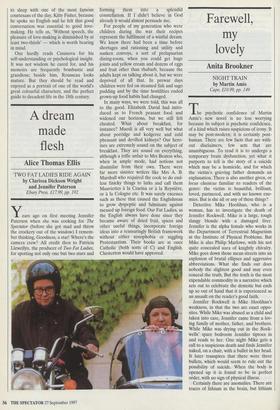A dream made flesh
Alice Thomas Ellis
TWO FAT LADIES RIDE AGAIN by Clarissa Dickson Wright and Jennifer Paterson Ebury Press, £17.99, pp. 192 Years ago on first meeting Jennifer Paterson when she was cooking for The Spectator (before she got mad and threw the crockery out of the window) I remem- ber thinking, Goodness, a star! Where's the camera crew? All credit then to Patricia Llewellyn, the producer of Two Fat Ladies, for spotting not only one but two stars and forming them into a splendid constellation. If I didn't believe in God already it would almost persuade me.
For people of my generation who were children during the war their recipes represent the fulfilment of a wistful dream. We knew there had been a time before shortages and rationing and utility and sunken convoys, a sort of prelapsarian dining-room, when you could get huge joints and yellow cream and dozens of eggs and fruit other than rhubarb, because the adults kept on talking about it, but we were deprived of all that. In prewar days children were fed on steamed fish and sago pudding and by the time hostilities ended grown-up food habits had changed.
In many ways, we were told, this was all to the good. Elizabeth David had intro- duced us to French peasant food and widened our horizons, but we still felt cheated. What about breakfast, for instance? Muesli is all very well but what about porridge and kedgeree and cold pheasant and devilled kidneys? Our hero- ines are extremely sound on the subject of breakfast. They are sound on everything, although a trifle unfair to Mrs Beaton who, when in ample mode, had notions not dissimilar from their own. There were far more sinister writers like Mrs A. B. Marshall who required the cook to do end- less finicky things to larks and call them Mauviettes a la Czarina or a la Reyniere, or a la Cologne etc. It was surely excesses such as these that caused the Englishman to grow dyspeptic and fulminate against messed up foreign food. Our Fat Ladies, as the English always have done since they became aware of dried fruit, spices and other useful things, incorporate foreign ideas into a reassuringly British framework without either xenophobia or niggling Protestantism. Their books are at once Catholic (both sorts of C) and English. Chesterton would have approved.










































































 Previous page
Previous page